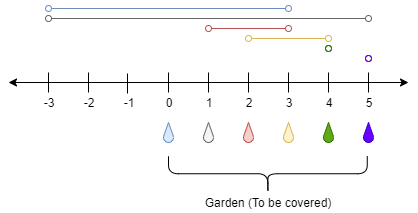1326. Minimum Number of Taps to Open to Water a Garden
Description
There is a one-dimensional garden on the x-axis. The garden starts at the point 0 and ends at the point n. (i.e., the length of the garden is n).
There are n + 1 taps located at points [0, 1, ..., n] in the garden.
Given an integer n and an integer array ranges of length n + 1 where ranges[i] (0-indexed) means the i-th tap can water the area [i - ranges[i], i + ranges[i]] if it was open.
Return the minimum number of taps that should be open to water the whole garden, If the garden cannot be watered return -1.
Example 1:

Input: n = 5, ranges = [3,4,1,1,0,0] Output: 1 Explanation: The tap at point 0 can cover the interval [-3,3] The tap at point 1 can cover the interval [-3,5] The tap at point 2 can cover the interval [1,3] The tap at point 3 can cover the interval [2,4] The tap at point 4 can cover the interval [4,4] The tap at point 5 can cover the interval [5,5] Opening Only the second tap will water the whole garden [0,5]
Example 2:
Input: n = 3, ranges = [0,0,0,0] Output: -1 Explanation: Even if you activate all the four taps you cannot water the whole garden.
Constraints:
1 <= n <= 104ranges.length == n + 10 <= ranges[i] <= 100
Solutions
Solution: Greedy
- Time complexity: O(n)
- Space complexity: O(n)
JavaScript
js
/**
* @param {number} n
* @param {number[]} ranges
* @return {number}
*/
const minTaps = function (n, ranges) {
const intervals = Array.from({ length: n + 1 }, () => 0);
for (let index = 0; index <= n; index++) {
const range = ranges[index];
const start = Math.max(index - range, 0);
const end = Math.min(index + range, n);
intervals[start] = Math.max(end - start, intervals[start]);
}
let end = 0;
let farthest = 0;
let result = 0;
for (let index = 0; index < n; index++) {
farthest = Math.max(index + intervals[index], farthest);
if (index === end) {
end = farthest;
result += 1;
}
}
return end === n ? result : -1;
};